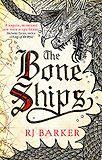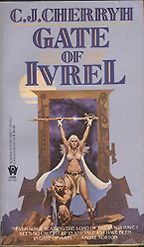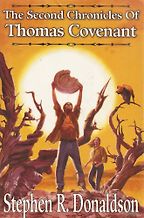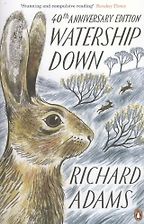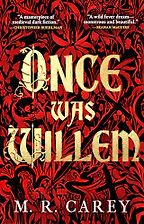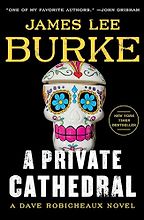What makes a compelling fantasy world?
For me, it’s the sense that the people you’re reading about live in that world. I’m a really picky reader, because it’s so easy to throw me out of something: if I think somebody in a fantasy world is reacting as someone from our world would, then I’m gone. It’s tiny things. I probably couldn’t read my own books because I know that I’ll do it, but when I’m reading other ones, I’m really easily thrown out.
An example – I’m not a fan of our swearing in fantasy books, just because I love language, and I’ve read too much about it, and a lot of our swearing is sort of mixed into our religion and our ideas of privacy. So as soon as you say “fuck”, that carries certain connotations about sex being shameful, but is it shameful in this world? And I’m off on a tangent… So I’m just really easily distracted.
I really like it when characters lock in, and you believe that the fantasy world is utterly real to them – that’s what drags me in.
Let’s talk about your first choice. Could you introduce Gate of Ivrel, by C. J. Cherryh?
I read this book when I was quite young, and there are books that blow your mind then because they do something that you were not expecting at that point in your life. I should add that this was C. J. Cherryh’s debut, which I think is rude, to be quite honest – no one has any right being that good for their debut.
It’s presented as a medieval fantasy book, and you see it through the eyes of Vanye, who is a barbarian-type figure. He’s pulled along on the adventures of Morgaine, who is a witch queen. The language is quite archaic, quite difficult, and it all adds to this olde-worlde feel with castles and all of that. But it’s all a lie! It’s not a fantasy book at all, it’s a science fiction novel. Morgaine has this magical sword that, when she draws it, is basically a howling vortex that can drag whole armies into it. She is from an incredibly advanced civilization, and they set up gates that allow you to teleport between worlds, that destabilise the entire universe. She is going through shutting them, and it creates havoc to the world she leaves; she is this bringer of chaos, and absolutely driven by this one purpose.
You follow Vanye, trying to understand Morgaine: how she can appear to be a decent human, but be prepared to create such havoc. He’s dragged with her through the first gate to the next world, which is the next book. And I just remember the huge joy of realizing that this book was not what it said it was. It was lying to me. It was doing something entirely different.
I’ve seen it shelved as fantasy and as sci fi, and sometimes it gets called science fantasy – science fantasy is really having a moment now, and this feels very ahead of its time for 1976.
Yes. There was this, and Gene Wolfe’s The Book of the New Sun books, which I never quite managed to click with in the same way. I keep thinking I should go back and make a proper try to read them again, but I didn’t click at the time.
But this one grabbed you…
I just loved it. I can’t have been that old, maybe sixteen or seventeen, and I thought, ‘Wow, you can do things that I’d not even considered.’ And that’s why I love it, for opening my mind. Cherryh writes fantastic science fiction, but this book has a proper place in my heart.
In my own books, there is Girton and Merela in the Assassin books, and Joron and Meas in The Bone Ships… I got an email from someone saying, ‘You like a powerful woman, don’t you?’ And I thought, ‘I know what you’re getting at, but you’re entirely wrong, it’s not a fetish. It’s me running through Morgaine and Vanye from those books, because they had such a huge effect on me; I think they’re always in my work.’
Your next choice is The Second Chronicles of Thomas Covenant by Stephen Donaldson, which is the second trilogy in a ten-book series. Please tell us about it.
These are basically stories about an awful man who I hate. He’s deeply unpleasant, and he has this magical ring that can save an entire world, that he just refuses to use. You spend the entire book thinking, ‘Just use the ring, Thomas Covenant, just do it…’
I need to explain the way that I’ve always bought books. I was going to be a rock star, you see, but unfortunately, I was not a particularly good musician, which will hold you back. So I spent most of my life entirely skint, and I read whatever was in the second-hand shop. I’ve never read the first Chronicles of Thomas Covenant, and I’ve never read any of the other chronicles of Thomas Covenant. I’ve only read the second.
The world of it is such an amazing bit of writing. It’s just astounding. You can see the influence of Tolkien in it, but some of the other stuff in it is just… I get quite jealous about it. He has these really beautiful moments: there’s the Ranyhyn, the horses, and the giant Saltheart Foamfollower… And there’s a whole thing in these books where the cycle of nature is massively accelerated, so forests grow up and then they die in a season. That has also dropped itself into The Bone Ships, which I didn’t realise until afterwards, although I did it a different way. Because that’s what you do, if you’re a writer: you steal something and then reinvent it, and then you can say, ‘Actually, no, that’s mine.’
I have no wish to read any of the others. I know people are not fans of the first ones, because of some of the acts that happen in them, so I’m not going to read them; and I’m not going to read the third ones, because everyone I know says they’re not quite as good. So I’m just keeping those three books, and my memories of them; they’re a huge influence on me.
They’re well worth it for the breadth of imagination, and because it’s very grown up, in a way that – this will get me in trouble – things like Wheel of Time did not feel grown up when I read them. They felt aimed at late teenage me (and I know someone’s going to tell me that changes as you read the Wheel of Time books onwards, but I’m not going to read ten books. I’m far too lazy.) But the Thomas Covenant books were not holding my hand at all, which I liked; I like to be pushed by a book. But please, just use the ring Thomas, God.
What’s the flavour of this world – friendly, unfriendly…?
It’s been made unfriendly by the bad guy… I talked about this being a grown-up book, but the bad guy is called Lord Foul. You put so much information into all of this, Stephen, and then you’ve just half-assed that, haven’t you? But it’s a beautiful world, which feels very real when you read it. It’s not a friendly or an unfriendly place, if you take out the influence of the bad guy; it’s just a place with its own rules, and it will work by them. And if you get caught up in that, then that’s unfortunate, right?
That’s the last truly secondary world on your list; after this, we look at fantasy worlds found inside our own. Your own book, The Bone Ships, is a secondary world, with heavy influence from the real nautical world… Could you tell us about it and the process of building it?
So, for context, I went back and forth on my list for today – I wanted to have Patrick O’Brien’s Master and Commander books there, because I adore them, and the world of a 17th-century sailing ship is so arcane, it feels like a fantasy world. It’s just so weird. So I wanted to write something with ships. And in Whitby Museum, they have ships that have been carved out of bone by Napoleonic prisoners of war, and that stuck in my head: ships of bone, that’s pretty cool…
So I wanted bone ships. Why would you build your ships out of bone? And the only answer is, because there’s no wood. So I needed to engineer a world without wood, which is how we get this world of vines that grow quite quickly during a season and then die back, and they’re not strong enough to make big ships. And then you get onto the question: how big does something need to be if you’re going to use its bones for ships? And the answer was: really big. So I had sea monsters. My editor was straight in with, ‘Let’s call them dragons.’ And I said, ‘I don’t think they really are dragons…’ But she said, ‘No, no, no. They’re dragons.’ So okay, we’ll call them dragons.
And that was the starting point. There wasn’t really much else, because I don’t sit and work things out at all. I have a few ideas that I want to do; I had a very clear idea of where we’re going for the end of the third book, which I’m not going to tell you because it’s hugely spoilery, and that feeds in right from the beginning of the first book. And then I create the world as I write. Everything snowballs, the plot feeds into the world, and it’s really useful because you’re never stuck. You’re never in a corner with the world: I can do what I want in it, it’s mine.
You mentioned language reflecting societies at the beginning of our chat today. The language in this world is so interesting – genders are somewhat reversed, but it’s not just a mirror image of our society…
Yes. There’s a matriarchal society, which I just wanted to do, because it makes people look at power again. I had this idea that in a lot of our societies, the ability to produce heirs is seen as a way to corral women, when really the women have the power because they actually bring the children to life – so I flipped it. And that was the starting point to set up this society.
Then it’s all about making sure the people in it really do live in it. So, for example, they say ‘women and men’ all the time, because women are more important than men in their world, so that’s how you structure the language. It’s a really simple thing that is also very alien when you read it, because you’re not used to it. Also, in both the Bone Ship books and the Wyrdwood books, my most recent, I have a non-gendered character. It’s so hard to catch that, because I’m old now, and I’ve got forty years of not using non-gendered pronouns. I have to teach myself that.
I’ve always wanted to write books that everyone can be in, which I think comes from being a bit weird all your life. So there’s trying to catch that, and then create ways that people can fit in that don’t feel like our society. Because I don’t want to go and read a fantasy book and think, “Oh, I recognize this from my world”. (Although obviously I have also massively ripped off the Age of Sail…)
The gendered aspect feels so intricately worked out, I would have believed you if you’d said you were a careful planner…
There was one plan, which is that I have a deep mistrust of people in power. And the idea was that it doesn’t matter whether it’s a man or a woman in power, they can still be awful. I’m very equal opportunities about who is awful.
The rest of it is all very organic, working it all together to find out where I end up. And then by the time I finish the second book and am writing the third one, it becomes very frustrating, because I can’t make things up anymore. I’ve got to live in the rules of my own world.
Let’s turn now to some fantasy worlds built inside our own world. Your next choice is the most famous on your list: for anyone who doesn’t know it, please tell us about Watership Down by Richard Adams.
Watership Down is the story of some rabbits that go somewhere, and things happen to them while they go there. Richard Adams said it is a book for children, and nothing else, and don’t get excited about it. But if you look at each chapter of Watership Down, it is headed by something from classical literature, and you think, ‘You’re lying to us, aren’t you, Richard Adams? This is not just a book for children.’ Although I do believe he might have thought that when he was writing it, because I don’t think we’re necessarily in control of what we write.
I love this book because every time you read it, you realize something different – it’s about something else. But I also love this book for how the society of the rabbits works, and it feels like rabbits could live in this world. It feels like a different type of civilization, the same way Adrian Tchaikovsky does it with his spiders and animals in his science fiction. They have all these rules and ways of doing things… And then later on, you realise that actually Richard Adams is talking about the British Army. And you think, ‘Oh, yeah… that makes sense.’
I think the great power of the book is how it speaks to you. When I was a kid, I was reasonably clever, but a bit odd, and I didn’t quite fit in. And when you give Hazel and Fiver to a kid like that, they think, ‘Oh, they’re me. I get that.’ Watership Down is about a better idea for a world, where the people who are genuinely trying to be good end up being the ones in charge, nominally.
It has the greatest moment in all of literature, when Bigwig protects his chief Rabbit’s burrow. And if you know what happens in that, then you know, and if you don’t, then you should go and read the book, because it’s brilliant.
It’s magical. When you meet the poet rabbits, there’s this whole thing about what happens when nature is disturbed that is genuinely unsettling. And you have these rabbits that are obsessed with death – why would rabbits be obsessed with death? And then you realise why: they’ve traded in being rabbits for a comfy life, but they know that the comfy life comes with a price, which is that some of them are just going to vanish some days. It’s properly creepy. What a book!
I love a book that is about a magical world, but also about a real place I could go and see.
[SPOILER ALERT]
I don’t know if, to me, Watership Down feels like it is set in the real world. I know Watership Down is a real place, but it doesn’t feel like it, because it’s the Elysian Fields: this mythical place that they find where they can live a perfect and happy life. I’ve never really thought about the book as being set in our world – it’s more like fairy land, in that it intersects with our world, but it’s other. It’s not part of it, and it’s quite magical.
A lot of people say that Watership Down is upsetting because, at the end, the main character dies. It’s not a spoiler, because if you’ve not heard that, then where have you been? But it’s the best kind of death, because he has achieved everything. He’s happy and he’s tired, and the moment when the Black Rabbit (who’s their spirit of death) comes to him and says, ‘You’re tired, come with me, and you can run again…’ Tears! It’s fantastic.
Let’s talk about the most recent book on your list: M. R. Carey’s Once Was Willem.
This book is just incredible. I’m fascinated by history. The further you go back, and the fewer answers we have, the more magic appears real, and the more the darkness of the forest becomes something genuinely frightening. Mike absolutely captures that.
This is the story of a boy who dies, and people make a deal with a sorcerer to raise him, which everyone knows you never do; but they don’t know that, because it’s the Middle Ages, and they’ve not got stories warning them of that yet. So they bring Willem back to life, but he’s been rotting for weeks, and he’s no longer human. He’s something else, a monster. And there are other monsters out there in the darkness, but they’re not really monsters, they’re just things doing their thing… and the plot all melds into this sorcerer who’s gradually taking over, and trying to do very bad things.
The plot was really good and enjoyable, but that is not what I was interested in at all. I was interested in how absolutely brilliantly he captures the idea of this being another time, and people thinking differently. Things that we would not think are possible seem very real to them. And when the supernatural is fed in – and this is going to come across in the next choice as well – it does not seem either strange or supernatural, it just seems to be part of that world.
I had to email Mike when I’d finished it and say, ‘That was astounding. How did you do that? I hate you. I’m gonna sulk for weeks about this.’
You mentioned your last choice there, so let’s talk about that… This is James Lee Burke’s Dave Robicheaux books, which begin with The Neon Rain.
The Dave Robicheaux books are stories about a private eye in the Louisiana Bayou. Don’t go into these expecting magic in the early books: you’re not going to get it there. But he writes with this glow to his writing that is just alive. It’s astounding. And the whole world of the Bayou seems, to me as a reader, quite otherworldly and strange, even while the events are very human: about power and who’s killing who, and about Robicheaux, an incredibly violent man trying not to be violent.
But then, little by little… There’s a book called In the Electric Mist with Confederate Dead (what a title!) where he’s dosed with acid, and he starts believing he can see Confederate soldiers. There’s a point in the book where his daughter has a history book, and there’s a photograph in it, and he’s in the photo with these Confederate soldiers… But you don’t know: is it supernatural? Even when it’s not being supernatural, it feels weirdly magical…
And then quite late on in the series, we get to a book called A Private Cathedral, where James Lee Burke has clearly just said, ‘I’m going all in.’ Dave Robicheaux is hunted by an immortal assassin from hell, and the showdown is on a steamboat in the River Styx. It shouldn’t work. It should be ridiculous, because these are detective books. But you never question it. It’s just so well done: he creates this area of the Deep South where it does seem like the impossible isn’t really shocking, and that the magical is always there, even though you might not ever mention it. When he goes full in on it, you just think, ‘Yes, I’m here for that.’ It’s a bit like John Connolly, but Connolly’s much more into the supernatural, he leans hard into it. James Lee Burke is very gentle and soft – until he’s not.
I can believe the Louisiana Bayou leads to the River Styx. That seems right.
Yes – and I think he’s quite Catholic, and that feeds into it a lot. He’s not ever trying to convert you, but guilt and redemption and the possibility of miracles seem to be built into his books.
I really strongly recommend them, just because they seem otherworldly, in a beautiful way.
It’s lovely to see someone building a world that makes fantasy plausible, without advertising it through the usual tropes. We’re coming up against the difficulties of trying to define with genre…
Yes. Just enjoy the things that you enjoy reading: all books are magical, all books are a created world. That’s the thing that I feel really strongly. It doesn’t matter how serious the book is and how ‘in our world,’ it’s still a fantasy. Someone once said to me that every novel is a series of unlikely coincidences that the author has to try and make you believe. And that’s the best description I’ve ever heard.
Interview by Sylvia Bishop
September 21, 2025. Updated: October 8, 2025
Five Books aims to keep its book recommendations and interviews up to date. If you are the interviewee and would like to update your choice of books (or even just what you say about them) please email us at [email protected]
Five Books interviews are expensive to produce. If you've enjoyed this interview, please support us by donating a small amount.

